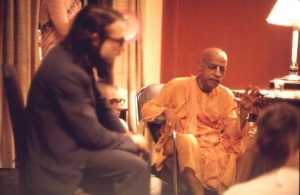SB 1.4.7: Difference between revisions
m (1 revision(s)) |
(Vanibot #0054 edit - transform synonyms into clickable links, which search similar occurrences) |
||
| (One intermediate revision by one other user not shown) | |||
| Line 1: | Line 1: | ||
{{info | {{info | ||
|speaker= | |speaker=Śaunaka Ṛṣi | ||
|listener= | |listener=Sūta Gosvāmī and the Sages | ||
}} | }} | ||
[[Category:Srimad-Bhagavatam - Canto 01 Chapter 04|S07]] | |||
[[Category:Bhagavatam Verses Spoken by Saunaka Rsi - Vanisource|010407]] | |||
<div style="float:left">'''[[Srimad-Bhagavatam]] - [[SB 1|First Canto]] - [[SB 1.4: The Appearance of Sri Narada|Chapter 4: The Appearance of Śrī Nārada]]'''</div> | |||
<div style="float:right">[[File:Go-previous.png|link=SB 1.4.6]] '''[[SB 1.4.6]] - [[SB 1.4.8]]''' [[File:Go-next.png|link=SB 1.4.8]]</div> | |||
{{CompareVersions|SB|1.4.7|SB 1962|SB 1972-77}} | |||
{{RandomImage}} | |||
==== TEXT 7 ==== | ==== TEXT 7 ==== | ||
<div | <div class="verse"> | ||
kathaṁ vā pāṇḍaveyasya | :kathaṁ vā pāṇḍaveyasya | ||
rājarṣer muninā saha | :rājarṣer muninā saha | ||
saṁvādaḥ samabhūt tāta | :saṁvādaḥ samabhūt tāta | ||
yatraiṣā sātvatī śrutiḥ | :yatraiṣā sātvatī śrutiḥ | ||
</div> | </div> | ||
| Line 17: | Line 23: | ||
==== SYNONYMS ==== | ==== SYNONYMS ==== | ||
<div | <div class="synonyms"> | ||
''[//vanipedia.org/wiki/Special:VaniSearch?s=katham&tab=syno_o&ds=1 katham]'' — how is it; ''[//vanipedia.org/wiki/Special:VaniSearch?s=vā&tab=syno_o&ds=1 vā]'' — also; ''[//vanipedia.org/wiki/Special:VaniSearch?s=pāṇḍaveyasya&tab=syno_o&ds=1 pāṇḍaveyasya]'' — of the descendant of Pāṇḍu (Parīkṣit); ''[//vanipedia.org/wiki/Special:VaniSearch?s=rājarṣeḥ&tab=syno_o&ds=1 rājarṣeḥ]'' — of the king who was a sage; ''[//vanipedia.org/wiki/Special:VaniSearch?s=muninā&tab=syno_o&ds=1 muninā]'' — with the muni; ''[//vanipedia.org/wiki/Special:VaniSearch?s=saha&tab=syno_o&ds=1 saha]'' — with; ''[//vanipedia.org/wiki/Special:VaniSearch?s=saṁvādaḥ&tab=syno_o&ds=1 saṁvādaḥ]'' — discussion; ''[//vanipedia.org/wiki/Special:VaniSearch?s=samabhūt&tab=syno_o&ds=1 samabhūt]'' — took place; ''[//vanipedia.org/wiki/Special:VaniSearch?s=tāta&tab=syno_o&ds=1 tāta]'' — O darling; ''[//vanipedia.org/wiki/Special:VaniSearch?s=yatra&tab=syno_o&ds=1 yatra]'' — whereupon; ''[//vanipedia.org/wiki/Special:VaniSearch?s=eṣā&tab=syno_o&ds=1 eṣā]'' — like this; ''[//vanipedia.org/wiki/Special:VaniSearch?s=sātvatī&tab=syno_o&ds=1 sātvatī]'' — transcendental; ''[//vanipedia.org/wiki/Special:VaniSearch?s=śrutiḥ&tab=syno_o&ds=1 śrutiḥ]'' — essence of the Vedas. | |||
</div> | </div> | ||
| Line 24: | Line 30: | ||
==== TRANSLATION ==== | ==== TRANSLATION ==== | ||
<div | <div class="translation"> | ||
How did it so happen that King Parīkṣit met this great sage, making it possible for this great transcendental essence of the Vedas [Bhāgavatam] to be sung to him? | How did it so happen that King Parīkṣit met this great sage, making it possible for this great transcendental essence of the Vedas [Bhāgavatam] to be sung to him? | ||
</div> | </div> | ||
| Line 31: | Line 37: | ||
==== PURPORT ==== | ==== PURPORT ==== | ||
<div | <div class="purport"> | ||
Śrīmad-Bhāgavatam is stated here as the essence of the Vedas. It is not an imaginary story as it is sometimes considered by unauthorized men. It is also called Śuka-saṁhitā, or the Vedic hymn spoken by Śrī Śukadeva Gosvāmī, the great liberated sage. | ''Śrīmad-Bhāgavatam'' is stated here as the essence of the ''Vedas''. It is not an imaginary story as it is sometimes considered by unauthorized men. It is also called ''Śuka-saṁhitā'', or the Vedic hymn spoken by Śrī Śukadeva Gosvāmī, the great liberated sage. | ||
</div> | </div> | ||
__NOTOC__ | |||
<div style="float:right; clear:both;">[[File:Go-previous.png|link=SB 1.4.6]] '''[[SB 1.4.6]] - [[SB 1.4.8]]''' [[File:Go-next.png|link=SB 1.4.8]]</div> | |||
__NOTOC__ | |||
__NOEDITSECTION__ | |||
Latest revision as of 18:10, 17 February 2024

A.C. Bhaktivedanta Swami Prabhupada
TEXT 7
- kathaṁ vā pāṇḍaveyasya
- rājarṣer muninā saha
- saṁvādaḥ samabhūt tāta
- yatraiṣā sātvatī śrutiḥ
SYNONYMS
katham — how is it; vā — also; pāṇḍaveyasya — of the descendant of Pāṇḍu (Parīkṣit); rājarṣeḥ — of the king who was a sage; muninā — with the muni; saha — with; saṁvādaḥ — discussion; samabhūt — took place; tāta — O darling; yatra — whereupon; eṣā — like this; sātvatī — transcendental; śrutiḥ — essence of the Vedas.
TRANSLATION
How did it so happen that King Parīkṣit met this great sage, making it possible for this great transcendental essence of the Vedas [Bhāgavatam] to be sung to him?
PURPORT
Śrīmad-Bhāgavatam is stated here as the essence of the Vedas. It is not an imaginary story as it is sometimes considered by unauthorized men. It is also called Śuka-saṁhitā, or the Vedic hymn spoken by Śrī Śukadeva Gosvāmī, the great liberated sage.